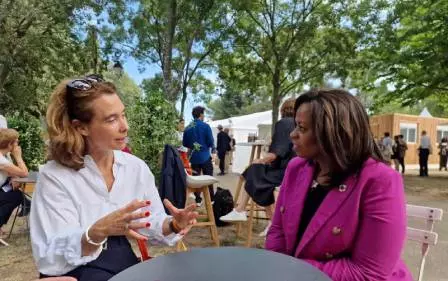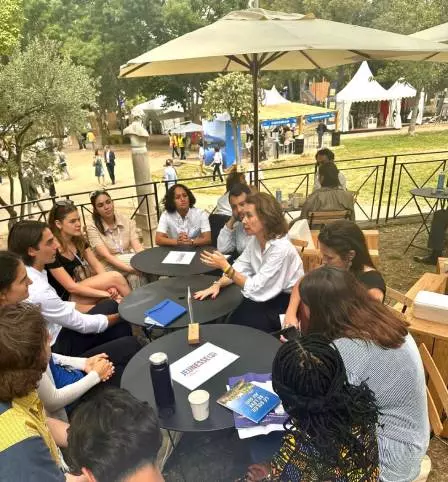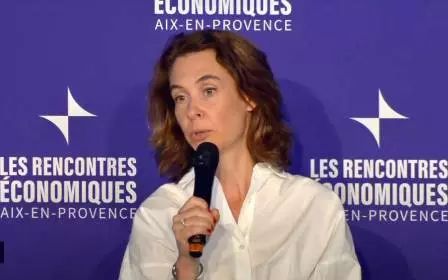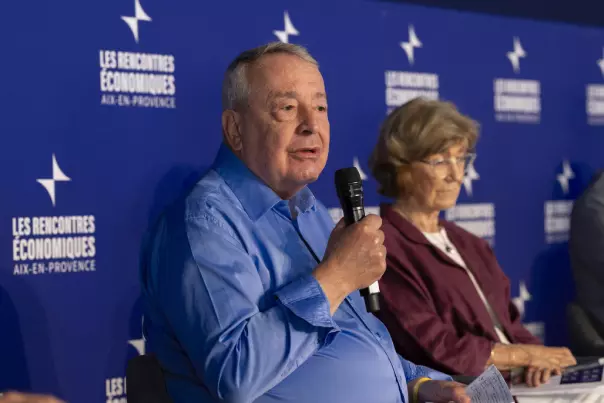Faced with the urgency to act against climate change and environmental degradation, the speakers highlighted the major economic challenges to be met, but also the opportunities to be seized. Estelle Brachlianoff recalled the importance of the action of all stakeholders in building a third way, protecting the health and purchasing power of citizens.
The imperative of a rapid ecological transition is no longer to be demonstrated, and the costs generated by inaction would be much higher in the long term than those of a profound transformation of our production and consumption patterns. This is the observation of Estelle Brachlianoff, during the plenary session "Ecological Planning, an economic mirage?" organized as part of the Rencontres Économiques d'Aix-en-Provence, the leading economic forum organized each year by Le Cercle des économistes for over 20 years.
"When we try today to oppose the end of the world and the end of the month, I think we are asking the wrong question."
Estelle Brachlianoff, CEO of Veolia

While environmental issues seem to have been relegated to the background in recent months, it is clear that the need to act quickly has never been more pressing. The physical realities of climate change, including disruptions to the water cycle, are already being felt, leading to a significant increase in insurance premiums in some regions.
It is this 'protective ecology', this third way that it is urgent to propose to meet their expectations for concrete results.
Estelle Brachlianoff, CEO of Veolia

Estelle Brachlianoff nevertheless recalled the existence of a third way. Indeed, the Barometer of the Ecological Transformation, published by Veolia and the consulting firm Elabe, reveals that the populations of the 26 countries surveyed have understood that the cost of inaction would be higher than that of action. Citizens aspire to an ecology that protects their purchasing power, their health and the wealth of their territory.
This is why the role of public authorities appears essential. The participants of the plenary session recalled that by setting a strong incentive framework, with ambitious regulations, green taxation and massive public investments, governments can create a favorable environment for the emergence of new markets, technological innovations and green jobs. Nevertheless, the divergences between countries and sectors of activity, depending on their respective situations, imply differentiated rhythms and modalities of transition.
"There is a real need for populations to act now and act fast."
Estelle Brachlianoff, CEO of Veolia

Beyond economic issues, the social dimension of this profound change must not be neglected. The involvement of citizens and the consideration of issues of equity and justice are essential for this ecological transition to be truly fair and accepted by all. The company must also play an increasing role in the training of young people and employees. This is what Antoine Frérot, President of Veolia, recalled during a plenary session entitled "Corporations at the bedside of the social ladder”, dedicated to social justice within companies, and to the upskilling of employees throughout their careers.
When the social elevator is broken down, society despairs. It is a society without a future for that generation. The company has an important role to play here, particularly in internal promotion. This is very important for the morale and hope of employees, as well as for social cohesion within a company.
Antoine Frérot, President of Veolia

During this plenary session, Antoine Frérot also mentioned Veolia Cares, a common base of social protection for all employees. In particular, the Group allows its employees to dedicate paid days to associations or organizations, for example specialized in environmental preservation. A way for Veolia to promote employee engagement and allow them to get involved in a cause they care about.
If the challenges to be met are considerable, most of the speakers argued for ambitious ecological planning, considered as an investment in the future rather than an economic brake. The time has come for resolute action to build the foundations of a new model of sustainable and environmentally friendly development.


